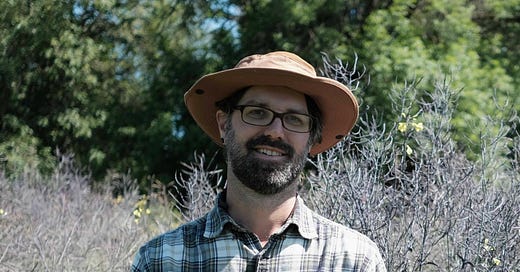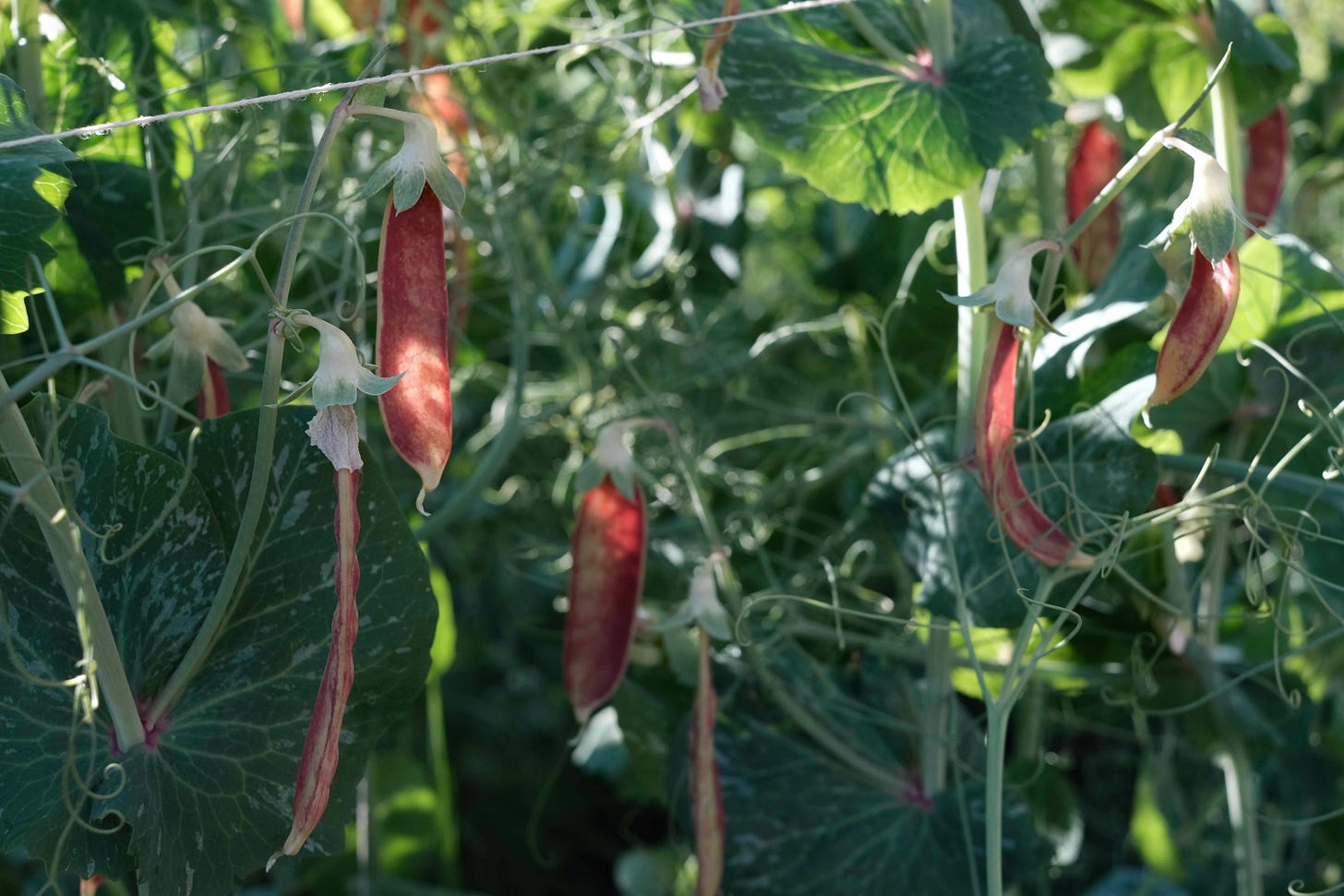Corvallis, OR
Home of Oregon State University, the Corvallis area has drawn in seed growers and plant breeders alike over the years, and there seems to be a thriving community of people engaged in seed sovereignty here. After my visit to Wild Garden Seeds, I made trips out to several other key figures in the seed network that are based in the area.
First stop was Hank Keogh at Avoca Seed. Avoca Seed was slightly different to the seed growers I had visited so far, as they are not a seed distributor, but a speciality seed production farm growing a diverse assortment of vegetable and flower crops on contract for seed companies nationwide. As well as a proficient seed grower, Hank is also an experienced plant breeder, having worked at Wild Garden Seed for many years. One of his varieties, Dazzling Blue Kale, has even made it across the Atlantic to the UK, and is known to be a resilient and delicious cultivar, so it was brilliant to see this beautiful lacinato type kale flowering in Hank’s fields.
The 7-acre organic farm is situated along the Willamette valley and is surrounded by extensive riparian restoration areas. Hank and his partner Jo produce seed crops on 3 of the 7 acres of land here, using cover crop rotations in an alternate year cropping system. Hank gave me a tour of the farm, walking me through the current seed crops in the ground, from peppers that were just being planted, to flowering celery and mustard crops. The vast field of Dazzling Blue Kale became a bit of a talking point – Hank had decided to make new selections on this crop for the plants that had survived the infamous ice storm last winter. As he explained to me, ‘there is power in epigenetics, it’s important to bring the story (of last winter) along’
Seeds remember. It’s something that feels like old wisdom, that perhaps somewhere along the journey we forgot.
Hank has a strong interest in stories, it’s something he feels could be the missing link in our current seed movement – connecting people’s stories to the seed they are growing. He references True Love Seeds on the East Coast, and the amazing work they are doing in bringing deeper meaning to the work of seed growing through connection and history.
‘Stewardship matters. The history of the seed is important. Seed should be grown in the region where it originates, or where people enjoy eating it. Particularly by those who have knowledge of that crop.’
Looking at some of the thriving Kale plants, it’s clear that Hank’s stewardship is contributing to a more resilient plant population in the future. He uses the technique of mixing seed from previous generations to bring the memory of the plants experiences into future seasons. Something I have heard of in the past and try and implement at home, so it’s reassuring to see this practice in action by a commercial seed grower.
Hank feels maintaining healthy adapted open pollinated populations in the face of change is more relevant than investing in development of F1 Hybrids. All of the varieties he grows at Avoca Seed are OP’s. ‘F1 breeding is breeding for something that humans can think of’. He reflects that no one had predicted the ice storm that happened last winter, how do we breed F1s for the extreme variation that is now occurring each year across the globe? Dry hot springs one year, wet cool springs the next. The open pollinated varieties, however, self select. Some of the Dazzling Blue kale plants survived the storm, and natural resilience was demonstrated in the field. ‘Our current climate is one of peaks and troughs, we need to breed plants that can respond to those. Adaptation to a specific trait is no longer relevant, we need overall resilience which can only come from diversity.’
There is such diversity of seed growers here in Oregon. Everyone has their own unique way of approaching their work. I have had several conversations, since arriving here, as to whether there is any competition - with there being so many seed growers and companies in one place. But the resounding response has been that there is probably still not enough. It’s very much a community, with people being open and sharing with their knowledge and expertise. When I was in Portland, whilst staying with Lane, I met with Don Tipping of Siskiyou Seed (more on that to follow!) and he and Lane used the perfect analogy – they described it as being like those stereotypical social groups of kids at school – there are the popular kids, the ‘jocks’, the ‘hippies’, the ‘artists’, the ‘geeky anarchists’, everyone has their own unique interests and approach to their work, allowing them to carve out their own niche. Diversity bringing resilience. Oregon is approximately the same size in landmass to the UK, time to dream big about what could be possible back home…
Later that day, I headed to Peace Seedlings, formed by Dylana Kapuler and Mario DiBenedetto.
Peace Seedlings is the next generation of Peace Seeds - founded in 1975 by Alan and Linda Kapuler. Alan Kapuler is arguably one of the founders of the seed movement here in Oregon. He and Linda spent more than 40 years collecting unique seeds and breeding diverse varieties, their catalogue and breeding efforts focusing on a wide variety of open pollinated and rare heirlooms alongside original varieties from their own breeding work.
Peace Seedlings have continued to grow and improve upon varieties developed in the earlier generations of Peace Seeds, whilst also developing their own unique offerings. Skilled plant breeders, Dylana and Mario show me around their current projects, and as it turns out I’ve hit peak pea season.
They have dozens of varieties of peas growing out, and as we wander amongst them Dylana hands me pod after pod to taste. Opal beauty, Green Beauty, Blushing Beauty, they are all prolific and delicious. She has been focusing on developing varieties that have ‘hyper tendrils’ so the plants need less support – making them less effort to maintain therefore hopefully inspiring more people to grow them. I am fortunate to gain a quick lesson in the intricacies of pea hand pollination from the expert. When I ask her how many flowers she tends to hand pollinate, she quips ‘all you need are a few. 5 seeds and you’re in a rabbit hole for the next decade!’
And I believe her. The diversity that presents itself is incredible. I was fortunate to have a sneak preview of new red pigmentation they had recently discovered in a variety they were about to give up on.
Not yet stable, they’re working on getting uniformity in the trait before releasing it to the world. Dylana has been hand pollinating peas since childhood, raised in the world of seed, she is clearly still very much in love with her work.
‘Food is what sustains everybody, and seed is how you get food. This is nourishing, ethical and important.’
She advises finding something you love, and following your heart.
This is niche work, and I have nothing but respect for Peace Seedlings dedication to retaining and expanding diversity in our food system. On their website, they eloquently sum up their intention: ‘We grow everything organikally, the K is for know your farmer and know your source. All seeds are not chemically treated, non GMO, no use of any pesticides or herbicides or ground plastic and grown using minimal organic fertiliser. All varieties are bred and selected by us, open-pollinated and public domain, some very new, and others very old, trusted selected heirlooms.’









